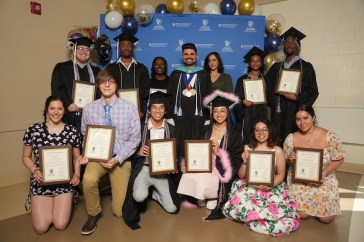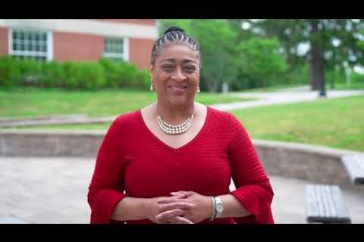Amidst the flurry of activity leading up to the New Hampshire primary, two experts in the political field were delving into some of the questions that plague voters and can, at times, contribute to voter apathy. Namely, what influence does each individual voter have and — ultimately — does your vote matter?
The event, entitled “Your Vote DOESn’t Count,” featured George Washington University Law School’s Spencer Overton and Andrew Smith, associate professor of practice in political science and director of the UNH Survey Center. The event was part of UNH’s 2016 MLK Celebration and preceded Overton’s keynote address that evening. Overton is the author of "Stealing Democracy: The New Politics of Voter Suppression.”
A Primary Education
There are many great things about studying political science at UNH, not the least of which is the department’s expert faculty. For Justin Curley ’16, the opportunity to work with members of that faculty and to be on campus during New Hampshire’s first-in-the-nation primary have made his college experiences extremely valuable.
So much so, in fact, that he has decided to pursue a graduate degree in political science here at UNH in the fall.

Chatting in the MUB food court in the midst of the lead-up to Tuesday’s primary, fresh from an event for Republican presidential hopeful Sen. Marco Rubio the night before, Curley talks about his decision to study political science at UNH.
He was looking at schools four years ago, and knowing he would be at UNH during a presidential election during his very first term in college and be able to experience all the energy around the primary as a senior “definitely helped” in his ultimate decision of where to attend school.
“I’ve never looked back,” he says. “It was a great decision.”
Curley praises the expertise of the political science faculty as a whole and of professors Dante Scala and Andrew Smith in particular. “I’ve learned so much from them,” he says.
He took his favorite class this past fall, and it focused specifically on the primary. “I hadn’t realized before how important New Hampshire is in the process,” he explains.
Leading up to the primary, Curley’s favorite part of the campaign season has been the opportunity to see the candidates in person and to volunteer for Rubio’s campaign.
“The Republican race has been a roller-coaster,” he says.
The afternoon's discussion included a question-and-answer session that drew comments from audience members of all ages and from as far away as Ireland.

Manus Brennan of Donegal, Ireland, explained he decided to come to the U.S. to volunteer for the Bernie Sanders campaign. The outcome of the presidential election here, he said, will have an impact across the globe.
“The complexities of your electoral system are amazing,” he said, cautioning that it is built to exclude rather than include voters.
He asked if there was any movement in the U.S. to simplify the electoral process through a system such as Ireland’s use of proportional representation, where voters rank each candidate on the ballot. This process, Brennan said, requires candidates to communicate with voters who might not be their supporters, because they need that second- or third-place vote, and allows for candidates beyond the main political parties to be elected.
Overton said there is momentum at state and local levels for such a system to address concerns about voter suppression and inequality. Examples of voter suppression can include limited polling times in some jurisdictions, which keep working voters from getting to the polls, or, as Overton examines in his book, changes to district boundaries and English-only ballots. The right to vote, both Overton and Smith stressed earlier in the talk, is not to be taken lightly, even if there are elements in the U.S. electoral process that are far from perfect.
With reactions to the Iowa caucus dominating the media that day and the UNH campus abuzz with plans for a debate between Democratic presidential contenders Hillary Clinton and Bernie Sanders the next night, Selina Taylor of the Office of First-Year Programs, who moderated the discussion, asked Overton and Smith to weigh in on what influences electoral democracy and instances where voters have limited access or are even barred from the ballot box. “It’s vital that people participate,” Overton said. When access is barred to some voters or made increasingly difficult, it becomes a case of “politicians selecting voters instead of voters selecting politicians.”
While the media’s focus and voters’ excitement tend to ramp up for presidential elections, state and local elections are extremely important, Smith and Overton stressed.

They also spoke about the impact of money in politics and on news organizations that, ultimately, need to sell advertising to stay in business.
With all those factors considered, Overton stressed, “We live in a republic, and we need your input to select those elected.”
Voters may not be able to discern everything about a candidate, Smith said, but going back to what the country’s founders called for in elected officials, he said, “You don’t have to go too far to determine if someone is an honest person.”
Stephanie Yee ’16, a psychology major and 2015 McNair Scholar, who gave the opening and closing remarks at the afternoon campus conversation before a packed Strafford Room in the MUB, described the importance of these discussions.
“Equity is near and dear to my heart,” she said, urging others to be an active part of the electoral process and to remember, “Many people marched and sacrificed and suffered in jail for our right to vote.
-
Written By:
Jennifer Saunders | Communications and Public Affairs | jennifer.saunders@unh.edu | 603-862-3585
















































